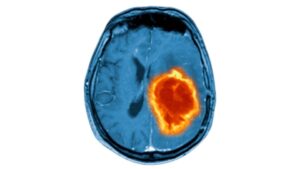Brain Tumor Surgery in West Islip
We are committed to treating surgical conditions of the brain and spine with state-of-the-art medical expertise, technology, sensitivity and care for the individual and their families. If you’re looking for Brain Tumor Surgery in West Islip, contact Dr. Symeon Missios, MD, FAAN, today! Be sure to reach out to our staff for more information about our services.
What Are Primary Brain Tumors?
Primary brain tumors are a type of abnormal growth that originates in the brain and central nervous system. These tumors can develop in various parts of the brain, including the cerebral hemispheres, brainstem, and cerebellum, and they can be either benign (non-cancerous) or malignant (cancerous). Understanding what primary brain tumors are, their causes, symptoms, and treatments is crucial for anyone who is experiencing neurological symptoms. If you or a loved one are suffering from a primary brain tumor, contact Dr. Symeon Missios, MD, FAANS, brain tumor surgery in West Islip, today!
Primary brain tumors are classified based on the type of cells that make up the tumor. The most common types of primary brain tumors include gliomas, meningiomas, pituitary tumors, and acoustic neuromas. Gliomas are the most common type of primary brain tumor and originate from the supportive tissue of the brain. Meningiomas are tumors that originate in the membranes that surround the brain and spinal cord, while pituitary tumors are tumors that develop in the pituitary gland, which is located at the base of the brain. Acoustic neuromas are tumors that develop in the nerve that connects the inner ear to the brain.
The exact cause of primary brain tumors is unknown, but some factors have been identified that may increase the risk of developing these tumors. These risk factors include exposure to radiation, family history of brain tumors, and certain genetic disorders. Additionally, some studies have suggested that exposure to certain chemicals, such as solvents and pesticides, may also increase the risk of developing primary brain tumors.
The symptoms of primary brain tumors can vary depending on the size, location, and type of the tumor. Some of the most common symptoms include headaches, seizures, vision changes, loss of coordination and balance, and changes in personality or behavior. In some cases, primary brain tumors can also cause symptoms such as hearing loss, nausea and vomiting, and memory loss.
Diagnosing primary brain tumors with brain tumor surgery in West Islip usually involves a combination of medical tests and exams, including MRI, CT scans, and biopsies. A biopsy is a procedure that involves removing a small sample of the tumor for laboratory analysis, which can help determine the type of tumor and whether it is benign or malignant.
Treatment for primary brain tumors depends on several factors, including the size, location, and type of the tumor, as well as the patient’s age, general health, and overall prognosis. The most common treatments for primary brain tumors include surgery, radiation therapy, and chemotherapy. In some cases, a combination of treatments may be necessary to achieve the best results.
Surgery is the most common treatment for primary brain tumors and is often the first line of treatment for many patients. Brain tumor surgery in West Islip specializes in performing these complex procedures and are equipped with the latest technology and techniques to ensure the best possible outcomes. Radiation therapy is also a commonly used treatment for primary brain tumors, and it involves using high-energy radiation to destroy the cancer cells. Chemotherapy is another option for patients who are not candidates for surgery or radiation therapy, and it involves using drugs to destroy the cancer cells.
Contact Us: Brain Tumor Surgery in West Islip
In conclusion, primary brain tumors are a type of abnormal growth that originate in the brain and central nervous system. These tumors can cause a wide range of symptoms, including headaches, seizures, vision changes, and changes in personality or behavior, and they can be either benign or malignant. If you are experiencing any of these symptoms, it is important to seek the help for brain tumor surgery in West Islip to provide you with a proper diagnosis and the right treatment to improve your quality of life. With their specialized training and expertise, neurosurgeons are equipped to handle a wide range of neurological conditions, and they can help you get the care you need to lead a healthy, active, and fulfilling life. Don’t wait until it’s too late to see a neurosurgeon. Early detection and treatment of primary brain tumors can greatly improve your chances of a successful outcome. So if you suspect that you or someone you know may have a primary brain tumor, don’t hesitate to seek the help of a neurosurgeon. Dr. Symeon Missios, MD, FAANS can provide you with the support, care, and guidance you need to navigate this challenging time and get the best possible treatment for your condition. Give us a call today!
What Are Metastatic Brain Tumors?
Metastatic brain tumors, also known as secondary brain tumors, are a type of cancer that originate from cells that have spread to the brain from another part of the body. These tumors are different from primary brain tumors, which start in the brain itself. Metastatic brain tumors are much more common than primary brain tumors, and they can occur in people of all ages. Brain tumor surgery in West Islip can help you, so schedule an appointment with Dr. Symeon Missios, MD, FAAN.
The symptoms of metastatic brain tumors can vary depending on the size and location of the tumor. Some common symptoms include headache, nausea, vomiting, confusion, memory loss, and seizures. In more severe cases, patients may experience changes in their vision, hearing, or speech, and they may experience paralysis or loss of feeling in certain parts of their body.
Diagnosis of metastatic brain tumors typically involves a combination of imaging tests and biopsy. A biopsy involves removing a small sample of the tumor for examination under a microscope. This helps Dr. Missios, brain tumor surgery in West Islip, determine the type and stage of the cancer, and it helps them develop a treatment plan.
Treatment for metastatic brain tumors typically involves a combination of surgery, radiation therapy, and chemotherapy. Surgery may be recommended to remove as much of the tumor as possible, and radiation therapy can help shrink the tumor and relieve symptoms. Chemotherapy may also be used to kill cancer cells, and it may be given before or after surgery, or in combination with radiation therapy.
It is important to remember that metastatic brain tumors can be difficult to treat, and the prognosis for each individual case will depend on a number of factors, including the size and location of the tumor, the type of cancer that has spread to the brain, and the patient’s overall health.
Contact Us: Brain Tumor Surgery in West Islip
If you or a loved one has been diagnosed with a metastatic brain tumor, it is important to seek the support and guidance of experienced healthcare professionals at brain tumor surgery in West Islip; who can help you understand your options and develop a plan of care. With the right treatment and support, you can get back to your everyday life. Contact Dr. Symeon Missios, MD, FAAN today!
Fill Out This Form For Brain Tumor Surgery in West Islip
What Is The Main Cause Of A Brain Tumor?
Brain tumors are a serious health concern and can cause significant damage to the brain and nervous system. Despite extensive research, the exact cause of brain tumors is not yet fully understood. However, there are several risk factors that have been identified. To learn more, contact Dr. Symeon Missios, MD, FAANS, brain tumor surgery in West Islip.
Risk Factors: 
A significant risk factor for brain tumors is exposure to radiation. This includes exposure to ionizing radiation, such as from medical imaging tests like CT scans, as well as exposure to non-ionizing radiation, such as from cell phone use. Recent studies show that people who have received radiation treatment to the head are at a higher risk of developing brain tumors.
Another risk factor for brain tumors is a genetic predisposition. Some rare genetic conditions, such as neurofibromatosis type 1 and type 2, are known to increase the risk of developing brain tumors. In addition, a family history of brain tumors may also increase an individual’s risk.
Environmental factors may also play a role in the development of brain tumors. Exposure to certain chemicals, such as pesticides and solvents, has been linked to an increased risk of brain tumors. However, the evidence linking environmental factors to brain tumors is not yet conclusive. Talk to your brain tumor surgery in West Islip to find out more!
Please note that not all brain tumors are cancerous, and not all brain cancers are caused by the same factors. Some brain tumors are benign, meaning they are not cancerous and will not spread to other parts of the body. Malignant brain tumors, on the other hand, are cancerous and commonly spread to other parts of the body.
The main cause of brain tumors is not fully understood, but there are several risk factors that have been identified, including exposure to radiation, genetic predisposition, and environmental factors. It is important to take precautions to reduce your risk of developing brain tumors, such as limiting exposure to radiation and taking steps to reduce exposure to environmental toxins. If you are worried about your risk of developing a brain tumor, it is important to discuss these with your brain tumor surgery in West Islip.
Contact Us: Brain Tumor Surgery in West Islip
If you are looking for brain tumor surgery in West Islip, contact Dr. Symeon Missios, MD, FAANS. Our team can help you get the proper treatment you need.
Expert Neurosurgery Services in West Islip, Long Island
When it comes to matters of the brain and spine, finding the right neurosurgeon is of paramount importance. Dr. Symeon Missios, a leading neurosurgeon practicing in West Islip, Long Island, specializes in neurosurgery and spine surgery. In this article, we will explore the world of neurosurgery, the conditions it can treat, and why choosing Dr. Symeon Missios for your neurosurgical needs is a decision worth considering.
What is Neurosurgery?
Neurosurgery is a highly specialized field of medicine that focuses on the diagnosis, treatment, and management of disorders affecting the brain, spinal cord, spine, and peripheral nerves. Neurosurgeons like Dr. Symeon Missios are trained to perform surgical procedures that can address a wide range of neurological conditions, from brain tumors to spinal stenosis.
Is Dr. Symeon Missios the Right Neurosurgeon for You?
Choosing the right neurosurgeon is crucial for your health and well-being. Here are several reasons why Dr. Symeon Missios stands out as a top choice:
1. Expertise in Brain and Spine Surgery
Dr. Symeon Missios is a board-certified neurosurgeon with extensive experience in both brain and spine surgery. His expertise covers a wide spectrum of neurological conditions, allowing patients to receive comprehensive care.
2. Minimally Invasive Techniques
In some cases, minimally invasive surgical techniques can provide effective treatment with smaller incisions and shorter recovery times. Dr. Missios is well-versed in these advanced approaches, prioritizing your comfort and well-being.
3. Multidisciplinary Approach
Dr. Symeon Missios understands that complex neurological conditions often require a team of specialists. He collaborates with other medical professionals, such as neuro-oncologists and interventional neuroradiologists, to provide the best care possible.
4. Cutting-Edge Treatments
As a practitioner of medicine affiliated with Stony Brook School of Medicine, Dr. Missios has access to the latest advancements in neurosurgery and medical research. This ensures that his patients receive the most up-to-date treatments available.
What Conditions Can Dr. Symeon Missios Treat?
Dr. Symeon Missios specializes in treating a wide range of neurological conditions, including:
1. Brain Tumors
Whether dealing with primary brain tumors or metastatic brain lesions, Dr. Missios has the expertise to diagnose and surgically treat these conditions.
2. Spinal Disorders
From herniated discs to spinal stenosis, Dr. Missios can address various spinal disorders, relieving patients from back pain and neurological symptoms.
3. Vascular Conditions
Conditions such as carotid artery disease and arteriovenous malformations require specialized care, and Dr. Missios has the knowledge and skill to provide it.
4. Chronic Subdural Hematoma
This condition, characterized by a collection of blood on the brain’s surface, can be effectively treated through surgical techniques.
Your Health, Our Priority
When it comes to neurological and spinal health, choosing an experienced and knowledgeable neurosurgeon is paramount. Dr. Symeon Missios is one of the leading neurosurgeons practicing in West Islip, Long Island. His commitment to patient well-being, use of cutting-edge techniques, and collaboration with a multidisciplinary team make him an excellent choice for those seeking neurosurgical care. Don’t let complex neurological conditions hold you back. Prioritize your health and seek the expertise of Dr. Symeon Missios for the best care available in West Islip, Long Island.




